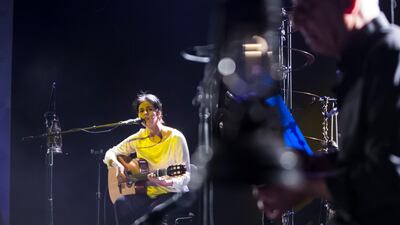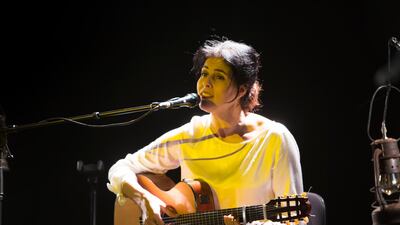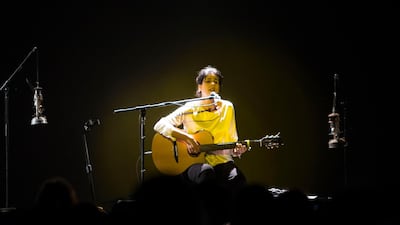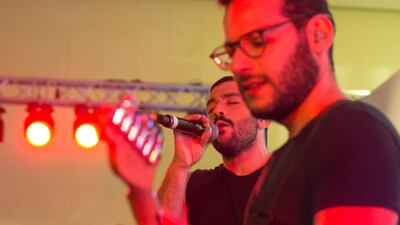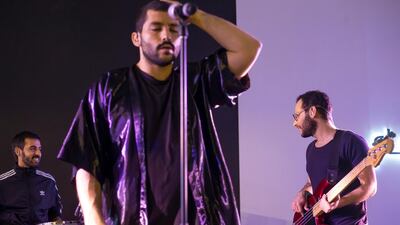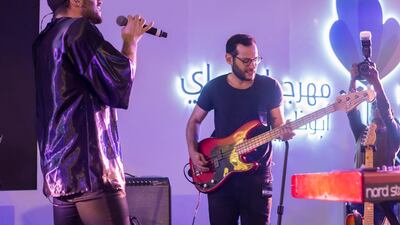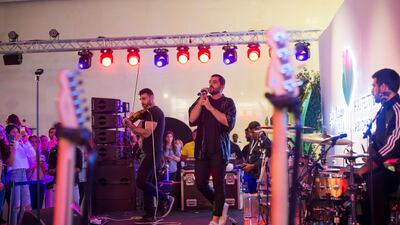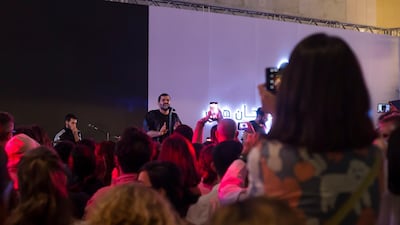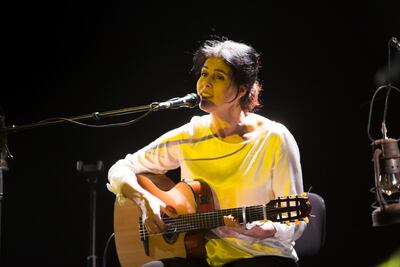Hay Festival Abu Dhabi concluded its opening night on Tuesday with a sparkling pair of performances at Manarat Al Saadiyat.
While fierce singer-songwriter Souad Massi and electro-poppers Mashrou’ Leila come from different sides of the tracks musically, it makes sense for the two to take part in the Abu Dhabi iteration of the famous literature festival.
The key reason being the role lyricism plays in both their works. For a decade, Mashrou’ Leila managed to capture the anxiety and disaffection of Arab millennials to such an extent that their songs went on to form the pseudo soundtrack for the present protests sweeping Lebanon. Massi, on the other hand, spins yarns in the great singer-songwriter tradition. Her songs are often mini stories or sketches of characters overcoming the loss of exile, in order to look forward.
"The lyrics are of primary importance and it has always been," Massi told The National before her concert. "I have to sing about something meaningful. Whether it is personal or something more general, it has always been about me conveying some sort of message."
Carl Gerges agrees. Sitting with The National before the band's anticipated appearance, the Mashrou' Leila drummer explained that while they never set out to make political songs, the band's evocative lyricism is malleable enough to be applied to different scenarios: "We never thought 'okay, let's tackle this political topic or that'," he said. "We often write what we are feeling and they are interpreted in various ways. We don't write political statements. It just ended up becoming that way."
Souad Massi delivers an enchanting performance
Could we have just witnessed a potential new favourite live music spot in the capital? Well, event ogranisers should take note of the Hay Festival Garden stage.
Located on the green grounds of the arts complex, the venue is essentially a well-built marquee with intimate staging and lighting. It may not look flashy, but with the lovely floral surroundings and fresh night air, it made for a serene atmosphere that Massi and her band reveled in.
Not that Massi needed the atmospheric help. The singer, 47, has been enchanting fans for nearly two decades with a body of work exploring everything from 12th century Arab figures Ibn Khaldun and modern day Algerian poet Ait Menguellet, to tender love songs and rock.
These strands came together for a truly spellbinding performance. Backed by her four-piece band, which included a violinist, guitarist, drummer and percussionist, Massi took us through a 90-minute set featuring favourites and new cuts from her recently released album Oumniya.
With the latest release having Massi venturing back to her intimate folk sound, the new songs all came across beautifully in Abu Dhabi. The album’s title track has a wistfulness that was only betrayed by its accusatory lyrics: “I gave you my hand…but you stabbed me.”
Another low-key highlight was Pays Natal. With lyrics supplied by French songwriters Marie Paule Belle and Francoise Mallet-Joris, the acoustic number is a mixture of tender folk and flamenco flair, with Massi's voice quietly anxious as she ponders a life in exile: "I have memories that remain in me/ There was nothing to regret there/ Yet I'm still thinking about it and I'm a little sore."
It wasn't all downbeat. Massi lifted the mood occasionally through a series of folk songs from the Algerian and Amazigh traditions. By the time the encore of signature Algerian chaabi tracks Nawsik Ya Qalbi and Raoui came along, the crowd were on their feet. It was a fitting end in what was a supremely elegant performance.
The deep groove of Mashrou’ Leila
When it comes to the Lebanese four-piece, who performed at the Atrium of Manarat Al Saadiyat, just being on your feet is not an option. The band’s throbbing grooves and percolating hooks command you to move.
It’s that universal quality that allowed the group to play all sorts of gigs, from indie-rock festivals in the UAE to dance music festivals in Europe.
However, while non-Arab speakers may enjoy the band on a purely sonic level, there is always an extra level of pathos when these songs are experienced in the Arab world.
For one thing, it all sounds so brilliantly vital. Where the Arab protest song has been confined to traditional folk compositions, Mashrou’ Leila updated the template by pairing their searing lyricism with a lavish lathering of synths, propulsive beats and the ingenious and unorthodox use of violins.
On top of it all is the vocals and presence of front-man Hamed Sinno. He is an enigmatic and intense vocalist who doesn't sing as much as mournfully wails. It works, as it beautifully blunts the razor sharp musicianship of the band, thus allowing tracks like the funky Salam and the groove-ridden Radio Romance to penetrate deeper.
This also often explains the emotional reactions fans have to their shows. Like in previous UAE gigs, a few young and spent fans were spotted wiping away tears at the end. This is not surprising, as Mashrou’ Leila perform dance music that releases and nourishes at the same time.
What’s next?
Ever see a harp played with rhythm and groove? Well, then check out Welsh harpist Catrin Finch and Senegalese kora player Seckou Keita perform on Wednesday, February 26. It may read as an unusual pairing, but together on stage the duo perform music that is loose, vibrant and joyous.
Show runs from 10pm to 11.30pm. Etihad Garden Stage. Tickets are Dh100 from www.hayfestival.com
